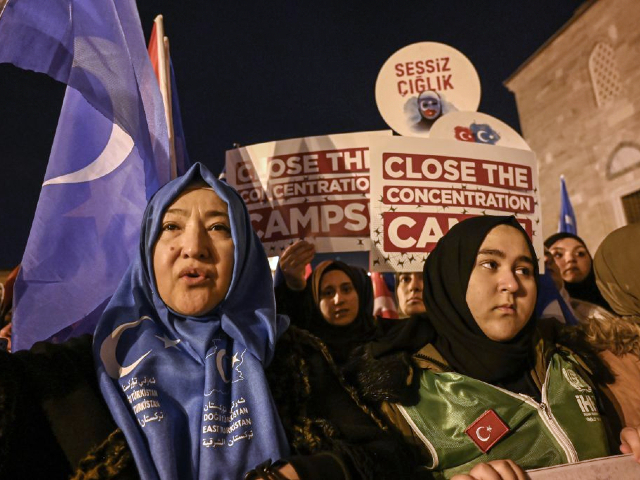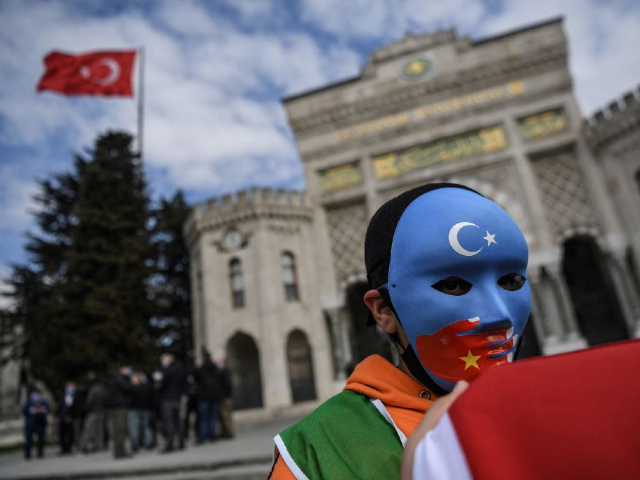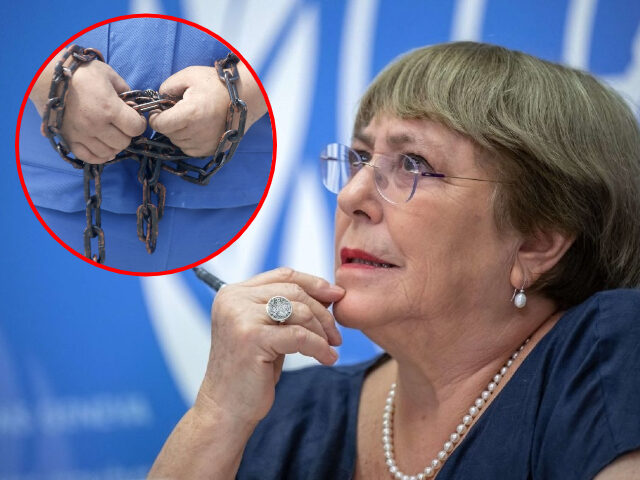The United Nations human rights office published its long-awaited report on Chinese Communist Party abuses against Uyghurs and other non-Han ethnic groups in East Turkistan on Wednesday, effectively confirming the atrocities researchers and journalists have documented for years but refusing to acknowledge the systematic elimination of these groups as genocide.
The word “genocide” does not appear in the 48-page document. The U.N. also refers to the mass enslavement of Uyghurs as “forced labor,” but not slavery, and refers to China’s concentration camps by their Communist Party name, “Vocational Education and Training Centers” (VETC). The agency claimed that, as per the government and in contravention of eyewitness testimony, the concentration camps have not existed since 2019, and alleged it was “not in a position to confirm this” either way.
Uyghur activists and allied human rights organizations have spent months demanding that the Office of the High Commissioner for Human Rights (OHCHR) release a report based on former High Commissioner Michelle Bachelet’s visit to East Turkistan, which the Communist Party refers to as Xinjiang, in May. At the time, Bachelet visited the region and Beijing but was largely prevented from touring concentration camps or meeting with victims of communist abuses.
Bachelet, the socialist former president of Chile, praised dictator Xi Jinping for alleged “tremendous achievements” in human rights during her visit to China and claimed that the Communist Party had “dismantled” its network of an estimated 1,200 concentration camps used to torture, rape, indoctrinate, sterilize, and enslave members of non-Han ethnic groups in East Turkistan.

Supporters of China’s Muslim Uighur minority wave the flag of East Turkestan and hold placards on December 20, 2019 during a demostration at Fatih in Istanbul. – More than 1,000 protesters marched Friday in Istanbul to protest against China over its treatment of mainly Muslim Uighurs in Xinjiang, an AFP correspondent said.They called for an end to the crackdown in China’s northwestern region, where upwards of one million Uighurs and other mostly Muslim minorities are believed to be held in re-education camps. (Photo by Ozan KOSE / AFP) (Photo by OZAN KOSE/AFP via Getty Images)
The United Nations published its official report on Bachelet’s visit on her last day as high commissioner; as of Thursday, she no longer holds the position, despite having been eligible to run for a second term.
The U.N. human rights office used the report to conclude that, based on its imprisonment and surveillance of Uyghurs and other Muslim-majority ethnic minority groups, it “may” be guilty of international crimes.
“Serious human rights violations have been committed in XUAR [Xinjiang Uyghur Autonomous Region] in the context of the Government’s application of counter-terrorism and counter-‘extremism’ strategies,” the report asserted, taking for granted Beijing’s claim that its destruction of Uyghur culture and concentration camp system is a means of containing radical Islamic terrorism.
The report nonetheless found, “the extent of arbitrary and discriminatory detention of members of Uyghur and other predominantly Muslim groups … may constitute international crimes, in particular crimes against humanity.”
While stating it is “grateful to the Government and other institutions” for helping with the report, the OHCHR largely uses information published by independent scholars such as Adrian Zenz – who published the Xinjiang Police Files, a database of concentration camp victims, police training documents, and other key government information, shortly before Bachelet arrived in East Turkistan – and human rights groups rather than any data collected by Bachelet herself. The report credits the government for official “documentation and information, including laws, policies, statistical data, court decisions, and official statements and White Papers” that were already in the public domain, leaving unclear how Beijing cooperated with the OHCHR.
Notably, unlike the source material it heavily depended on, the U.N. report does not find that China is guilty of genocide. It also documents extensive non-consensual medical testing on concentration camp victims but does not detail this testing, which eyewitnesses have said in the past is consistent with testing for live organ harvesting. The accusations of organ harvesting do not appear in the report.
The largest share of unique evidence the U.N. debuted is the content of 40 interviews with “individuals with direct and first-hand knowledge of the situation in XUAR,” including concentration camp victims – all of which allegedly had never spoken about their experiences before.
Like previous eyewitness testimonies, the concentration camp victims who spoke to U.N. personnel described the widespread use of rape, torture, involuntary drugging, and incessant communist indoctrination by staff in the camps.
“Their accounts included being beaten with batons, including electric batons while strapped in a so-called ‘tiger chair,’ being subjected to interrogation with water being poured in their faces;” the report read in part, “prolonged solitary confinement; and being forced to sit motionless on small stools for prolonged periods of time.”
The report also documented rape against “mainly” women, including “having been forced by guards to perform oral sex in the context of an interrogation and various forms of sexual humiliation, including forced nudity.”
The document mentions rape only briefly and omits some of the most outrageous accusations that concentration camp survivors have levied in public, such as the use of electric batons to rape women, gang rape in secret rooms by camp guards, and an alleged instance in which a woman was raped in front of 200 other prisoners and those who winced or tried to look away were punished.
Outside of the camps, the report mentions the existence of the “Becoming Family” program, in which the Chinese government forces non-Han families to accept Han Party members as “family” to live in their home. Past reports have documented extensive sexual assault of the women in the households, as sometimes these “relatives” force themselves to sleep in bed with the family matriarch.
The U.N. documented only “sexual harassment and other forms of intrusive discomfort” as part of the “Becoming Family” program.

A demonstrator wears a mask painted with the colours of the flag of East Turkestan during a protest by supporters of the Uighur minority on April 1, 2021 at beyazid square in Istanbul. – At least one million Uyghurs and people from other mostly Muslim groups have been held in camps in northwestern Xinjiang, according to rights groups, who accuse Chinese authorities of forcibly sterilising women and imposing forced labour. (Photo by Ozan KOSE / AFP) (Photo by OZAN KOSE/AFP via Getty Images)
Other atrocities the document hints at in only a cursory manner are medical violations that other reports have indicated may be in the service of harvesting organs from prisoners.
“Almost all interviewees described either injections, pills or both being administered regularly, as well as blood samples being regularly collected in the VETC facilities,” the report noted.
The United Nations acknowledged reports of widespread forced sterilization of women beginning in 2017 and a corresponding collapse in Uyghur and non-Han birthrates in East Turkistan following the implementation of this program.
“Official population figures indicate a sharp decline in birth rates in XUAR from 2017,” the report read. “In Hotan, which is 96 per cent Uyghur, birth rates went from 20.94 per cent in 2016246 to 8.58 per cent per thousand births in 2018.”
“Several women interviewed by OHCHR raised allegations of forced birth control, in particular forced IUD placements and possible forced sterilisations with respect to Uyghur and ethnic Kazakh women,” the report continued. “Some women spoke of the risk of harsh punishments including ‘internment’ or ‘imprisonment’ for violations of the family planning policy.”
Human rights experts around the world have concluded that the eradication of non-Han culture coupled with forced sterilization presents compelling evidence for genocide – which the U.N.’s laws define as “acts committed with intent to destroy, in whole or in part, a national, ethnical, racial or religious group.” The U.N., however, did not use that word in its report.
The report instead concluded vaguely that crimes against humanity – a catch-all for a series of crimes meant as a “widespread or systematic attack directed against any civilian population” – “may” have occurred in East Turkistan.
The U.N. urged the Chinese government to voluntarily cease committing such potential crimes against humanity.

COMMENTS
Please let us know if you're having issues with commenting.